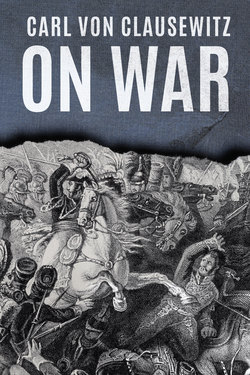Читать книгу On War - Carl von Clausewitz - Страница 13
На сайте Литреса книга снята с продажи.
ОглавлениеAfter the close of the Russian campaign Clausewitz remained in the service of that country, but was attached as a Russian staff officer to Blücher’s headquarters till the Armistice in 1813.
In 1814, he became Chief of the Staff of General Walmoden’s Russo-German Corps, which formed part of the Army of the North under Bernadotte. His name is frequently mentioned with distinction in that campaign, particularly in connection with the affair of Goehrde.
Clausewitz re-entered the Prussian service in 1815, and served as Chief of the Staff to Thielman’s corps, which was engaged with Grouchy at Wavre, on the 18th of June.
After the Peace, he was employed in a command on the Rhine. In 1818, he became Major-General, and Director of the Military School at which he had been previously educated.
In 1830, he was appointed Inspector of Artillery at Breslau, but soon after nominated Chief of the Staff to the Army of Observation, under Marshal Gneisenau on the Polish frontier.
The latest notices of his life and services are probably to be found in the memoirs of General Brandt, who, from being on the staff of Gneisenau’s army, was brought into daily intercourse with Clausewitz in matters of duty, and also frequently met him at the table of Marshal Gneisenau, at Posen.
Amongst other anecdotes, General Brandt relates that, upon one occasion, the conversation at the Marshal’s table turned upon a sermon preached by a priest, in which some great absurdities were introduced, and a discussion arose as to whether the Bishop should not be made responsible for what the priest had said. This led to the topic of theology in general, when General Brandt, speaking of himself, says, “I expressed an opinion that theology is only to be regarded as an historical process, as a moment in the gradual development of the human race. This brought upon me an attack from all quarters, but more especially from Clausewitz, who ought to have been on my side, he having been an adherent and pupil of Kiesewetter’s, who had indoctrinated him in the philosophy of Kant, certainly diluted—I might even say in homœopathic doses.” This anecdote is only interesting as the mention of Kiesewetter points to a circumstance in the life of Clausewitz that may have had an influence in forming those habits of thought which distinguish his writings.
“The way,” says General Brandt, “in which General Clausewitz judged of things, drew conclusions from movements and marches, calculated the times of the marches, and the points where decisions would take place, was extremely interesting. Fate has unfortunately denied him an opportunity of showing his talents in high command, but I have a firm persuasion that as a strategist he would have greatly distinguished himself. As a leader on the field of battle, on the other hand, he would not have been so much in his right place, from a manque d’habitude du commandement, he wanted the art d’enlever les troupes.”
After the Prussian Army of Observation was dissolved, Clausewitz returned to Breslau, and a few days after his arrival was seized with cholera, the seeds of which he must have brought with him from the army on the Polish frontier. His death took place in November 1831.
His writings are contained in nine volumes, published after his death, but his fame rests most upon the three volumes forming his treatise on “War.” In the present attempt to render into English this portion of the works of Clausewitz, the translator is sensible of many deficiencies, but he hopes at all events to succeed in making this celebrated treatise better known in England, believing, as he does, that so far as the work concerns the interests of this country, it has lost none of the importance it possessed at the time of its first publication.
J. J. GRAHAM (Col.)
